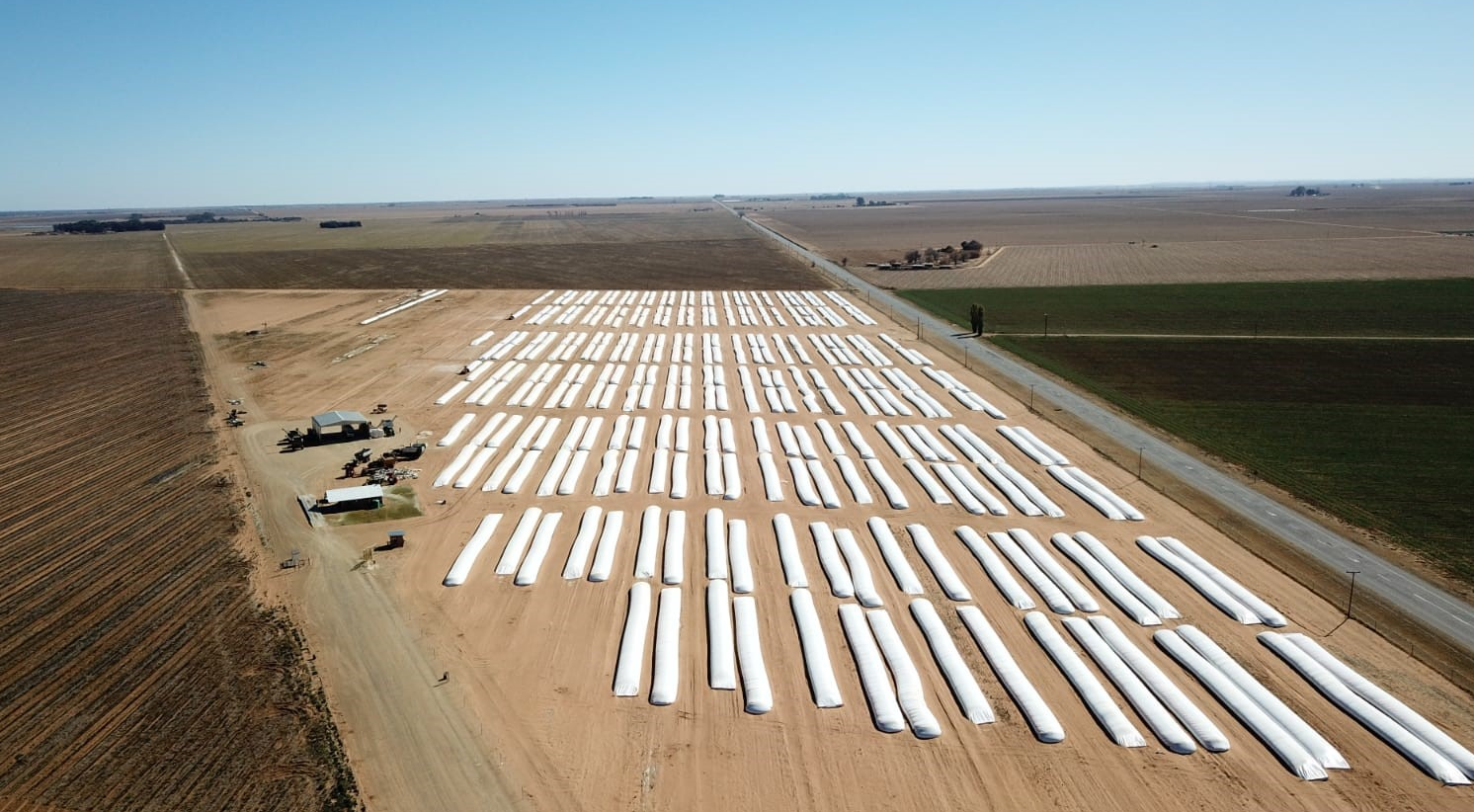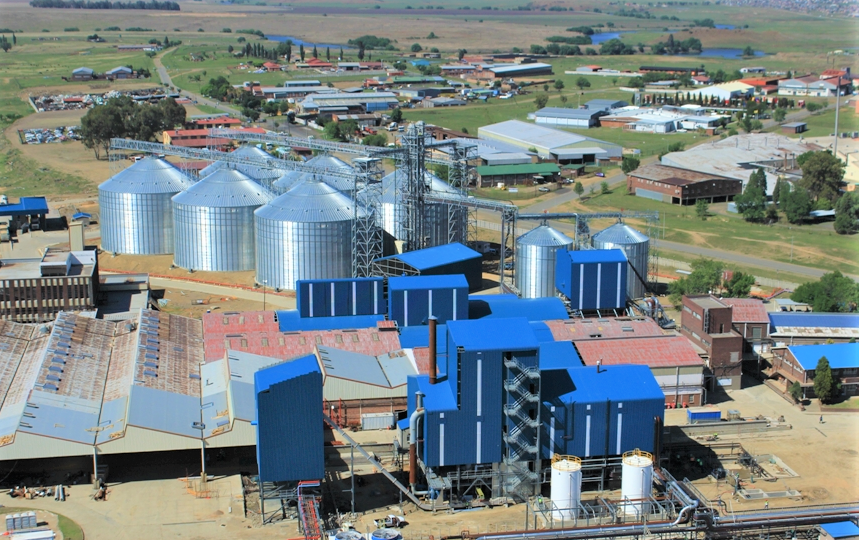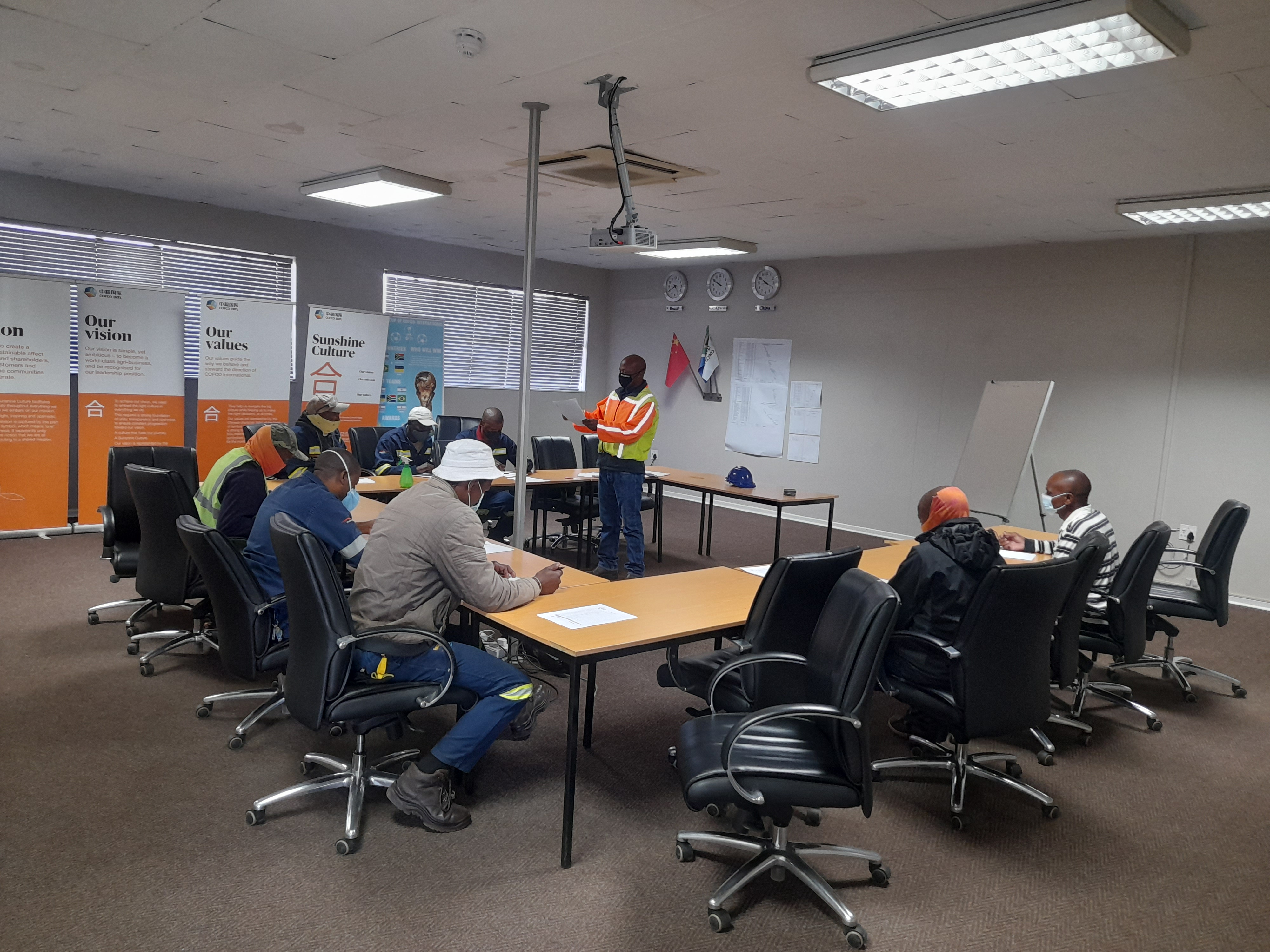
Corn is packed in bags after being harvested at a plantation co-run by COFCO International South Africa. [Photo provided to China Daily]
Multinational working hard to support food security around the globe
In the past three decades, Chinese agricultural technician Xie Jian has made over 30 visits to Southeast Asia and several to Africa to help reduce post-harvest rice losses and strengthen the rice value chain."Post-harvest food loss is a persistent problem in global food production," said Xie, a senior agricultural technician at COFCO Engineering and Technology Co. "China has many leading technologies that can reduce post-harvest rice loss and strengthen the rice value chain, and we want to share our technologies and best practices with the world."
According to a report by the United Nations Food and Agriculture Organization, post-harvest losses can be as high as 20 percent for cereals, 30 percent for dairy and fish, and 40 percent for fruits and vegetables. Much of this loss happens because of a lack of technology, limited knowledge of the supply chain, limited access to markets, poor infrastructure and inadequate financing.
Xie said that post-harvest food loss is a serious issue in many countries, due to the lack of proper tools, infrastructure and technology. He has participated in many projects to help Southeast Asian and African countries reduce losses during the process of drying, storing and processing products, and has also shared China's experience with them.
"China has developed fast over the past few decades and has accumulated a wealth of technological and management experience," he said. "This can be used for international reference and contribute to global food security."
Carlos Watson, representative of the FAO in China, said that the country is at the forefront of efforts to help developing nations meet their own development goals.
"The FAO and China have been actively strengthening cooperation to integrate resources to promote the agricultural development and food security of other developing countries," he said.
Apart from making financial contributions, China has shared its considerable experience and practical agricultural technologies and policy solutions with them, he added.

An aerial photo shows the COFCO crushing plant in Standerton. [Photo provided to China Daily]
Supporting South Africa
Johan Steyn, managing director for sub-Saharan Africa at COFCO International, a subsidiary of COFCO Corp, said that the company entered South Africa in 2016.Since then, through the implementation of advanced farming models and technology, COFCO International has supported the continuous improvement of yields, contributing to food security and supply in the country.
"Even throughout the COVID-19 pandemic, COFCO International continued giving support and facilitating activities to ensure that the food supply chain did not break down and that the South African people had access to safe and affordable food," he said.
COFCO International South Africa employs 390 people and trades more than 2 million metric tons of grains and oilseeds annually. Its operation in South Africa is supported through three primary commercial activities.
First, it operates the largest soybean processing facility in the country, with an annual capacity of more than 420,000 tons. It also participates in commercial partnerships with South African farmers in the cultivation of approximately 71,000 hectares on which it produces roughly 327,000 tons of produce that are sold to domestic and foreign markets.
"We also help in the provision of affordable food and animal feed. Our farming operations supplied more than 320,000 tons of produce last year, while our processing operations were responsible for the supply of over 330,000 tons," Steyn said.
"Additionally, we help the South African agricultural industry with price discovery, which is critical to achieving a balance between the supply and demand of products, and we assist the market in achieving this goal, which aids the security of food supply."
Steyn added that COFCO International South Africa has made significant efforts to support rural economic development and improve livelihoods, including by renovating centers to help vulnerable groups and donating food to disadvantaged areas in which the company's offices are based. For example, in Standerton, where the COFCO crushing plant is located, funds were directed toward improving an orphanage and an elderly care facility.
"We have also partnered with an organization that provides training and on-farm support," he said.
Cooperation is key
Chen Yangfen, a researcher at the Chinese Academy of Agricultural Sciences' Institute of Agricultural Economics and Development, said that China's exchanges and cooperation in the agricultural sector have deepened over the years, and opening-up has also increased."China's bilateral and multilateral agricultural cooperation and scientific and technological exchanges with key countries, regions and international organizations have also achieved remarkable results, contributing greatly to world agricultural development," he said.
Dong Wei, CEO of COFCO International, said that the company has built a global supply chain network of bulk agricultural products covering about 100 countries and regions, with 11,500 overseas employees and more than $14 billion in assets.
COFCO International is present throughout the industrial chain, including farming operations involving grains and oilseeds in South Africa and sugar cane in Brazil, as well as in the storage, processing, logistics, sales, and trade and distribution of products worldwide. These mainly include grains, oilseeds, sugar, cotton and coffee, and annual trading volume exceeds 100 million tons, Dong said.
"COFCO International mainly sources agricultural products from major global food production areas, such as South America, North America and the Black Sea region, and sells them to countries and regions including China, the Asia-Pacific, Europe, the Caribbean, the Middle East and North Africa, establishing a global logistics system between food production areas and sales areas," he said.

Employees of the COFCO crushing plant in Standerton, South Africa, attend a training on safety in production. [Photo provided to China Daily]
Upholding sustainability
COFCO International has worked hard to promote the construction of storage, logistics, and transshipment facilities in major food production areas.Through the expansion of new storage facilities, the capacity of inland transshipment warehouses and supporting processing warehouses has been improved to a certain extent, and the capacity of food-sourcing, storage, and logistics in production areas has been enhanced.
By the end of last year, COFCO International's global grain, oil and sugar processing facilities had an annual processing capacity of about 27 million tons and a storage capacity of about 2.3 million tons, and it had more than 30 million tons of products in port terminals.
In stabilizing global supply chains and logistics, COFCO International holds sustainability as one of its core values, he said.
"Not only do we have a team dedicated to the development and execution of our sustainability programs, but our leadership ensures that sustainability is woven into both our strategy and our operations to ensure we remain competitive," he said. "Each year, we train farmers in agricultural skills in key countries to enhance their capacity to develop sustainable agriculture, and we implement energy and water conservation and emission reduction measures to reduce our environmental impact and capture opportunities for improved operational efficiency."
The company prioritizes the transition to green energy, with around 85 percent of its global energy needs currently being met through renewable sources.
It also supports the United Nations Global Compact and its 2030 Sustainable Development Goals, the most ambitious example being its efforts to halt agricultural commodity-driven deforestation in its soy supply chains, together with other global agribusinesses.
In November last year, COFCO joined 12 of the world's largest agricultural enterprises at the United Nations COP26 conference in the United Kingdom, committing to a shared roadmap for enhanced supply chain action consistent with efforts to keep global temperatures from increasing beyond the 1.5 C mark.
"We have already initiated a global climate change strategy that covers our entire footprint, and we are working together with industries to launch a collectively agreed roadmap aligned with global climate goals at COP27 in Egypt next month," Dong said.
The company's efforts to halt commodity-driven deforestation rely on its ability to trace its soy supply chain.
This journey started in 2017 and today involves a complex system, including remote sensing satellites to monitor major social and environmental risks.
The system now covers all of its soy-producing regions in Brazil, and the company has since committed to achieving a deforestation and conversion-free soy supply chain across the Amazon, the Cerrado and the Gran Chaco, which are South America's most environmentally sensitive regions.
COFCO International also operates a fleet of dry bulk carriers as part of commodity trading with maritime logistics and risk management around the world.
It has around 200 vessels afloat at any given time and it monitors their greenhouse gas emissions and uses AI and other technology to make fuel, energy and efficiency savings in line with the shipping industry's ambitions to halve greenhouse gas emissions by 2050.
COFCO is also a member of the Sea Cargo Charter, and together with 16 global energy, agriculture, mining and trading companies, has pledged measures to reduce carbon emissions from maritime operations.
"We remain steadfast in our commitment to feed the world responsibly and help transform the global food system," Dong said.
"Over the past few years, we have leveraged our flexibility and innovation to build resilience and overcome disruption during uncertain times. And in everything we do, we prioritize the safety of our people and the continuity of our supply chains while accelerating the transformation of our food and agricultural system."





